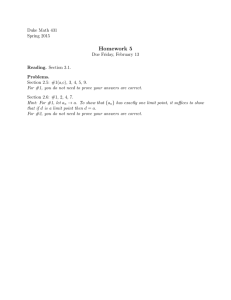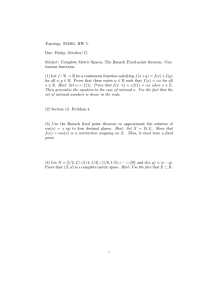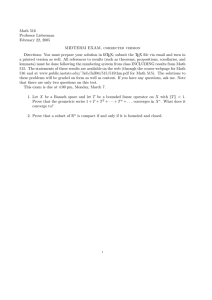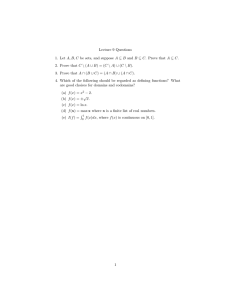LOYOLA COLLEGE (AUTONOMOUS), CHENNAI – 600 034
advertisement
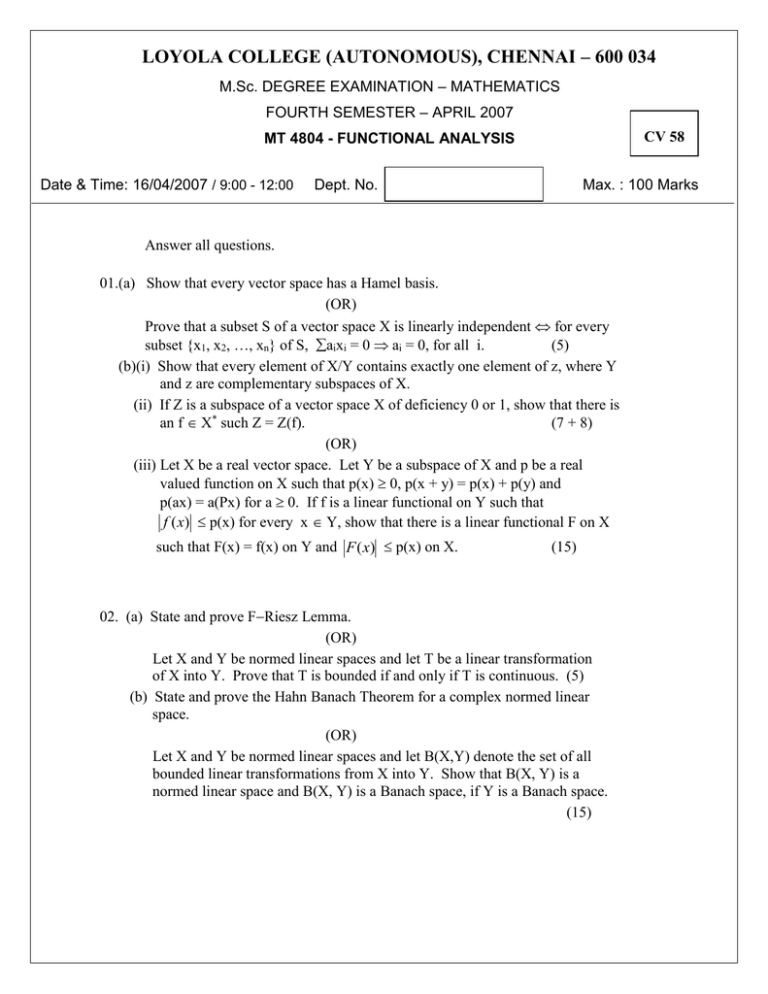
LOYOLA COLLEGE (AUTONOMOUS), CHENNAI – 600 034
M.Sc. DEGREE EXAMINATION – MATHEMATICS
FOURTH SEMESTER – APRIL 2007
CV 58
MT 4804 - FUNCTIONAL ANALYSIS
Date & Time: 16/04/2007 / 9:00 - 12:00
Dept. No.
Max. : 100 Marks
Answer all questions.
01.(a) Show that every vector space has a Hamel basis.
(OR)
Prove that a subset S of a vector space X is linearly independent for every
subset {x1, x2, …, xn} of S, aixi = 0 ai = 0, for all i.
(5)
(b)(i) Show that every element of X/Y contains exactly one element of z, where Y
and z are complementary subspaces of X.
(ii) If Z is a subspace of a vector space X of deficiency 0 or 1, show that there is
an f X* such Z = Z(f).
(7 + 8)
(OR)
(iii) Let X be a real vector space. Let Y be a subspace of X and p be a real
valued function on X such that p(x) 0, p(x + y) = p(x) + p(y) and
p(ax) = a(Px) for a 0. If f is a linear functional on Y such that
f (x) p(x) for every x Y, show that there is a linear functional F on X
such that F(x) = f(x) on Y and F (x) p(x) on X.
(15)
02. (a) State and prove FRiesz Lemma.
(OR)
Let X and Y be normed linear spaces and let T be a linear transformation
of X into Y. Prove that T is bounded if and only if T is continuous. (5)
(b) State and prove the Hahn Banach Theorem for a complex normed linear
space.
(OR)
Let X and Y be normed linear spaces and let B(X,Y) denote the set of all
bounded linear transformations from X into Y. Show that B(X, Y) is a
normed linear space and B(X, Y) is a Banach space, if Y is a Banach space.
(15)
03. (a) State and prove Riesz Representation Theorem.
(OR)
Prove that a real Banach space is a Hilbert space iff the parallelogram law
holds in it.
(5)
(b) State and prove the Projection Theorem.
(OR)
If X and Y are Banach spaces and if T is a continuous linear transformation
of X onto Y, then prove that T is an open mapping.
(15)
04. (a) State and prove Bessel’s inequality.
(OR)
If T is an operator on a Hilbert space X, show that T is a normal its real
and imaginary parts commute.
(5)
(b)(i) If T is an operator in a Hilbert space X, then show that
(Tx, x) = 0 T = 0.
(ii) If N1 and N2 are normal operators on a Hilbert space X with the property
that either commute with adjoint of the other, prove that N1 + N2 and N1N2
are normal.
(7 + 8)
(OR)
(iii) State and prove RieszFischer Theorem.
(15)
05. (a) Prove that the spectrum of x, (x) , is nonempty.
(OR)
Define a Banach algebra A, set of regular elements G, set of singular
elements S, and prove that G is open and S is closed.
(5)
(b) State and prove the Spectral theorem.
(OR)
Let G be a set of regular elements in a Banach algebra A.
(5)
1
Prove that f : G G given by f(x) = x is a homeomorphism.
X
X
X
